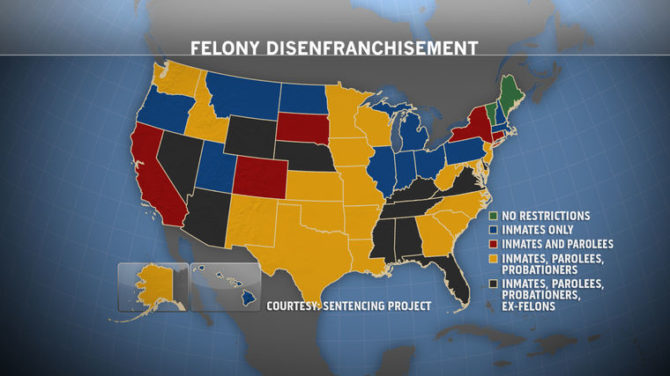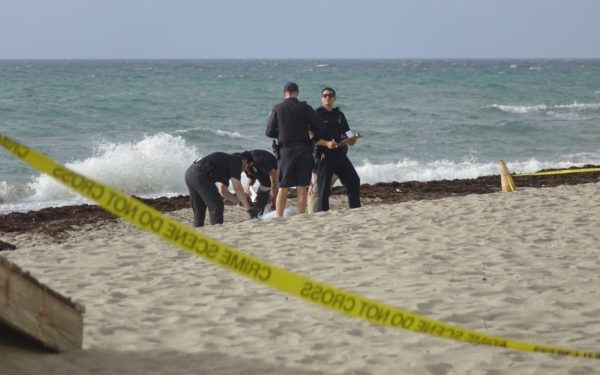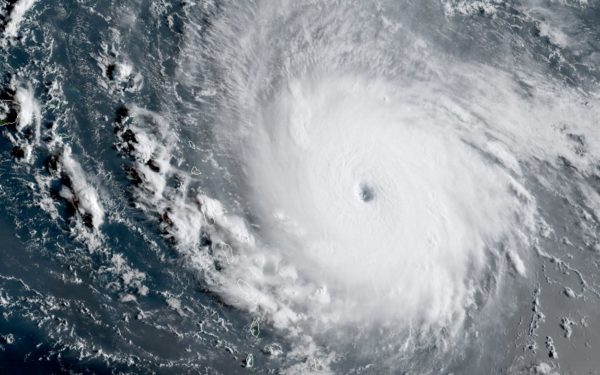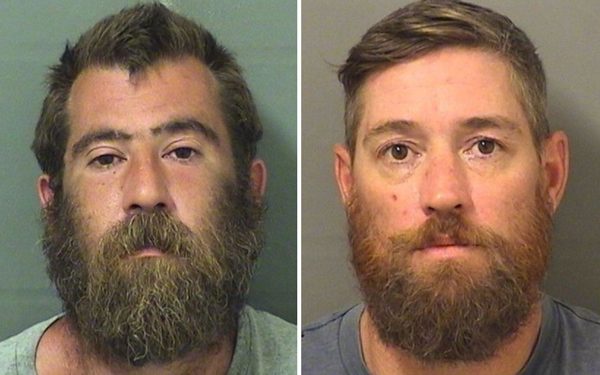Approximately thirty (30%) percent of the US population is comprised of Blacks and Hispanics, yet roughly sixty (60%) percent of the US’s prison population is comprised of Blacks and Hispanics.
I know that some of you believe any deception thrown your way, but there is no way that you can ever convince me that Blacks and Hispanics are responsible for sixty (60%) percent of the crimes that take place in America. Regardless of what the truth behind the numbers there are some aspects they represent that are indisputable.
Blacks and Hispanics are arrested and imprisoned at a rate far disproportionate to their numbers in the population. State lawmakers and courts have used section 2 of the 14th Amendment of the US Constitution which (paraphrased) permits states to adopt rules for disenfranchisement for participation in rebellion or other crimes. The courts upholding of the various laws restricting the rights of those convicted of crimes (usually felonies) include the loss of the right to vote. The use of the disenfranchisement provision has made the US one of the most punitive nations in the world with regards to rights of felons including the denial of voting rights.
Most of us will agree that crime is bad and those that commit crimes should receive some form of punishment. I think we can all rationally accept people serving prison sentences losing the right to vote during their actual incarceration periods. Presently only two states (Maine and Vermont) have unrestricted voting rights for felons even allowing them to vote via absentee ballot while imprisoned. Perhaps not un-coincidentally Maine and Vermont are states with significantly low populations of minorities.
So why should anyone care about felons rights to vote? We should care because the punitive measures to limit and/or restrict felons’ right to vote in fact have very real political intent and consequences.
Florida one of the most crucial key and swing states in national elections has one of the most restrictive felon voting rights in place. This in spite of the fact that in 2007 Republican governor Charlie Crist pushed for reforms to have less restrictive voting rights in place quicker for felon after serving sentence, probation and parole Those reforms were abolished and hardened in 2011 by present Republican governor Rick Scott.
Today, in Florida, voting rights for less serious crimes are only restored after a period of Five (5) years has elapsed after the completion of incarceration as well as the completion of any parole as well as the completion of any probation period. For “serious” crimes, petitions to the Florida Board of Executive Clemency must be sought heard and granted. The petitions may only come after Seven (7) years have elapsed after the completions of incarceration, parole and probation.
The effect of such laws in Florida are that nearly 1 in 10 Floridian and nearly Twenty Five (25%) percent or 1 in 4 of African American Floridian are shut out from voting due to the restrictions. For some perspective understand that George Bush won the 2004 presidential election by winning the state of Florida. He won the state of Florida by an official count of 537 votes. His re-election in 2004 was also largely determined by his win in Florida over John Kerry. He won Florida by 380,978 votes. That seems like a large number, specially in relation to only a 537 margin the first time, but keep in perspective that there are over 1,500,000 disenfranchised voters in Florida and a large majority of them are from a group that would have been historically known to vote against Bush and other Republicans.
In the United States well over Five (5,000,000) million people are disenfranchised and not allowed to vote. I do not know the specific number, but keeping in mind the disproportionate numbers of Blacks and Hispanics imprisoned, it is safe to safe that a vast majority of those disenfranchised are Black and Hispanics.
Only Iowa and Kentucky, where only the governor can reinstate Civil Rights for felons, are nearly as harsh as Florida in restrictive process, but every other state (excepting Vermont and Maine) has some level of restrictions on felons rights to vote.
I argue that no matter where you stand on crime and punishment, restricting voting rights to felons anytime after they have served an incarceration sentence is noting more than political plows to suppress voting. If someone has served their sentence in prison or jail, then they in no way should be restricted. If the person has been deemed privileged enough to have their freedom on the streets to vote (no matter how restricted by probation or parole they are still amongst society) than the basic right to vote should in no way be restricted.
These attempts at voter restriction are just one example of how important the right to vote is and our participation in the process is absolutely essentially to any future change of those that do not often feel they have protected rights or a vote. The bombastic personality that is Donald Trump has probably ensure a galvanizing of people to get out and vote these presidential elections, but what people really need to understand is that the local state and judicial elections are just as (if not more) important to the issues and rights of all people, but especially minorities.
#felonsrights
#votersuppression
#disenfranchisement



